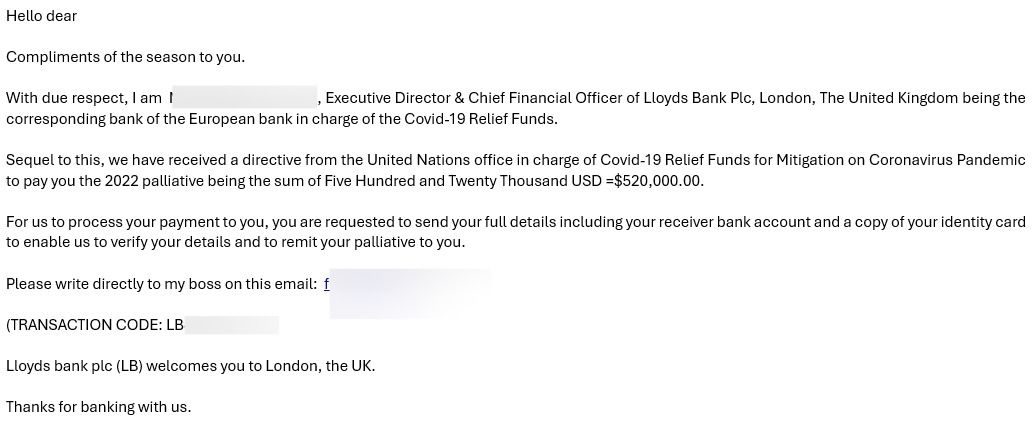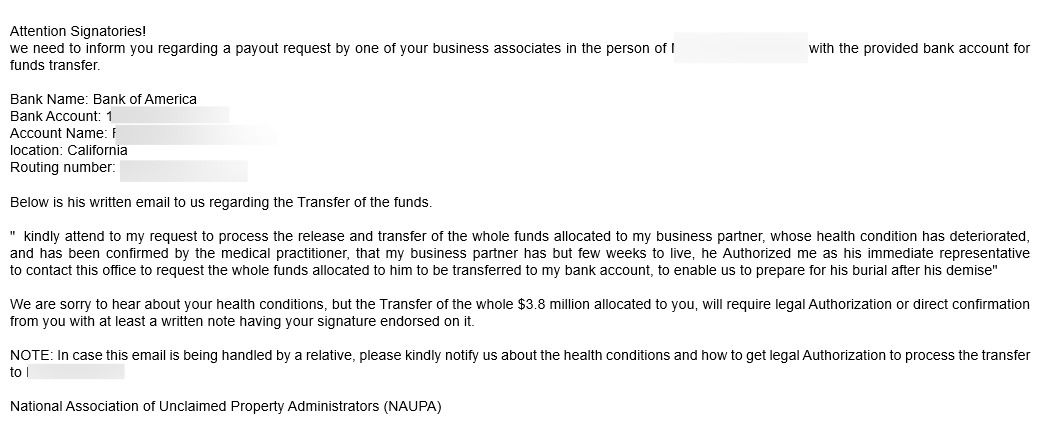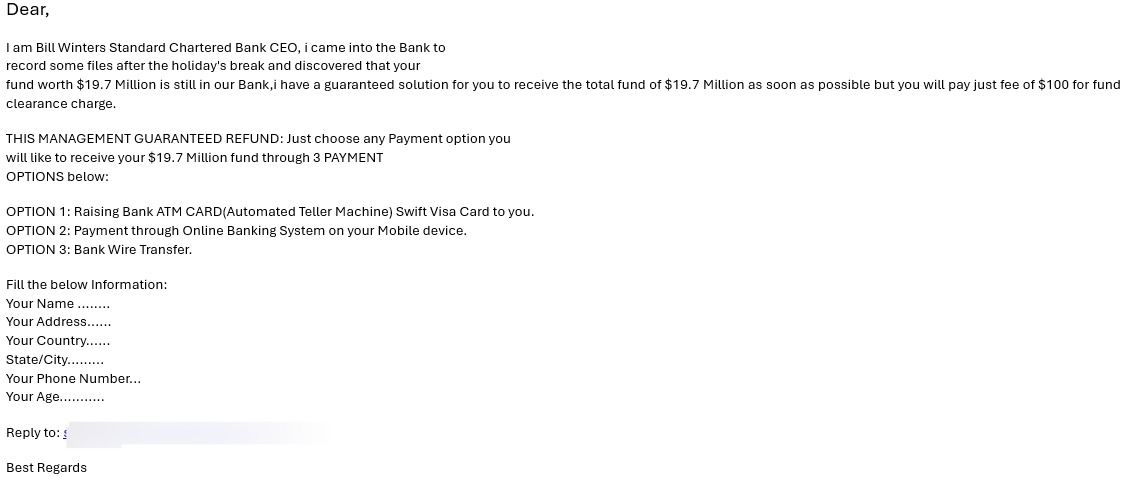Advance Fee Scams: What They Are, How to Spot Them and Safety Tips

The internet is filled with scammers who prey on unsuspecting individuals with seemingly benign messages, so scam awareness can go far in protecting your identity and money in the digital age.
What are Advance Fee Scams?
Advance fee scams hold a special place in cybercrooks' agendas. They lure millions of victims with fraudulent schemes every year, typically promising targets a large sum of money, goods, or even services for an upfront payment. These initial fees are disguised as taxes, processing fees, or some other type of cost. Any promised benefit never materializes once the victim pays the fee, and the scammer disappears with the money.
Did you know?
- The Federal Trade Commission (FTC) reported over 14,000 cases of advance payments for credit services in 2023, with losses exceeding $34 million.
- The FTC also noted over 80,000 prize, sweepstakes, and lottery fraud reports with losses exceeding $170 million in 2023.
- Researchers at Bitdefender Antispam Lab note that 4% of the global spam emails received between March and May 2024 were tagged as an advance fee scam.
- Advance fee scams can be traced in the offline world back to the early 19th century. The "Spanish Prisoner" scam was one of its earliest forms in which a scammer would claim to be a very wealthy individual imprisoned in Spain who needed money to secure his release. The victim was promised a share of the wealth once liberated.
How Advance Fee Scams work
- The Approach: A scammer contacts potential victims via email, social media, or phone. They may pose as government officials, a well-known lottery, financial institution or a wealthy individual, businessman or celebrity.
- The Hook: Targets are told they've inherited money, won the lottery, or have been selected for a profitable investment opportunity.
- The Request: Victims are asked to pay a fee in advance to receive the promised benefit.
- The Payoff: After the payment is made, fraudsters either demand additional fees or disappear entirely with the victim’s money and personal information
Common Advance Fee Scams
1. Lottery and Giveaway Scams. You receive a message informing you that you’ve won a large sum of money or a valuable prize (various goods, vouchers, etc.), but to claim it, you must pay a fee.
Example: You receive an unsolicited email saying you've won three million dollars in the Powerball Lottery. To collect your winnings, you must pay a $1,000 processing fee.
Related: Beware of scammers posing as lottery winners on social media
Related: Cha-ching! Bitdefender Antispam Lab warns of lottery scams ahead of National Lottery Day
Related: What are mystery box scams and how can you protect against them?
2. Inheritance Scams. Fraudsters claim you are the beneficiary of a large inheritance from a distant relative or wealthy individual. To access the funds, you must make upfront payments for legal fees or taxes upfront.
Example: A lawyer or financial representative contacts you, stating you are the heir to a $25 million estate. Before the inheritance can be transferred, you need to pay $2,000 in legal fees.
3. Loan Scams. Scammers promise guaranteed loans or credit cards to individuals with poor credit, but they must pay a fee in advance to process the application.
Example: A representative from a financial institution contacts you out of the blue and guarantees you a $8,000 loan despite your bad credit. However, you need to pay a $300 application fee first.
4. Job Offer Scams. You receive a high-paying job offer (usually remote) or lucrative business opportunity but are required to pay an upfront fee for background checks, equipment, training or other expenses.
Example: You receive a job offer on LinkedIn for a remote position with a very attractive salary. To start, you need to pay $200 for a background check and training materials.
Related: The anatomy of a scam: ‘Like YouTube Videos and Get Paid’ schemes
5. Illuminati Scams. Scammers pose as members of the Illuminati and claim you’ve have been selected to become a member. They’ll tell you that joining will bring wealth, power, and many other benefits, but you will need to provide a lot of personally identifiable information and pay an initiation fee.
Example: A recruiter for the Illuminati contacts you via email, social media or WhatsApp and promises money and fame. If you agree, the fraudsters ask you to fill out a registration form and begin ask you to pay an initial recruitment fee of $1,500.
Related: The anatomy of Illuminati scams: We spoke to the grand masters so you don’t have to
6. Fraud Recovery Scams. Scammers pose as fraud recovery firms, promising to help you recover money lost after falling for a scam. These scams target victims who have already been harmed by other swindles and promise reimbursement of stolen funds or bigger returns in exchange for money upfront. These are particularly insidious schemes, that involve scammers recycling the information from previous victims. This means that victims who have previously fallen for a different scam are put on a list that contains their personal information, such as contact info, the type of scam they fell for, and the amount paid.
Example: You receive a phone call or email from an individual claiming to work for a fraud recovery service. You are told that criminals who stole your money have been caught and that they have recuperated your lost money or financial assets (even crypto). The money will be transferred to your account once you make a $500 payment.
7. West African Letter, 419 Fraud or Nigerian Prince Scam. This scam is named after the Nigerian Criminal Code, Section 419, and involves scammers who claim to be officials or royalty needing help transferring large sums of money out of their country. As usual, victims are promised substantial rewards, but must make payments in advance to cover various fees made up by the scammers.
Example: You receive an email from an individual claiming to be a Nigerian prince who needs your help to transfer $25 million. You must first pay $1,000 for legal and transaction fees to receive your reward for assisting.
And now, for a short interlude of TV scam trivia
In the hit TV show The Office, Michael Scott, the endearing regional manager of Dunder Mifflin, also falls victim to the Nigerian Prince scam – not once, but multiple times. Although the episode (Season 2, Episode 19) serves as a comedic moment in the popular series, Michael’s encounter with the “Nigerian Princes” also stands as an example of how scammers target vulnerable or gullible individuals.
Samples of advance fee emails courtesy of Bitdefender Antispam researcher Viorel Zavoiu:





How to protect against Advance Fee Scams
- Be skeptical of unsolicited offers. Scrutinize unexpected messages or calls claiming you’ve won money, inherited wealth, or are eligible for a guaranteed loan. Remember, if it sounds too good to be true, it probably is!
- Always verify the source. Before making any payments, verify the legitimacy of the offer. Contact the organization directly using contact information on the official website (don’t follow the links in the email or text).
- Never pay upfront fees. A legitimate business or organization will not ask you to pay in advance for prizes, loans, or inheritances.
- Research the individual or business. Look up names, proposals and check for complaints or scam reports online.
- Don’t overshare personal information. Don’t share personal or financial information with unknown contacts. Scammers can use this information to commit fraud.
- Report scams. If you suspect you’ve been targeted by advance fee scams, report it to the appropriate authorities in your country. Contact the FTC and BBB if you are in the US.
- Use scam detection tools. Use Bitdefender Scamio, our next-gen AI scam detector for free. Scamio is always ready to help you instantly check any scam. You can send any tricky text, instant message, link, QR code, or email to Scamio to get an instant analysis.
Scamio can be accessed on any device or operating system via web browser, Facebook Messenger, or WhatsApp. You can also help others stay safe by sharing Scamio with them in France, Germany, Spain, Italy, Romania, Australia, and the UK
8. Use dedicated security tools. Bitdefender security solutions can help you block scams by detecting phishing and fraudulent websites, including ones that promote advance fee scams.
9. Keep a close eye on your digital identity. Use a dedicated identity protection service that can give you a detailed overview of your publicly available information and data breach history. Scammers can easily exploit leaked information to target you with scams, take over your accounts, and commit identity theft.
tags
Author
Alina is a history buff passionate about cybersecurity and anything sci-fi, advocating Bitdefender technologies and solutions. She spends most of her time between her two feline friends and traveling.
View all postsRight now Top posts
How to Protect Your WhatsApp from Hackers and Scammers – 8 Key Settings and Best Practices
April 03, 2025
Outpacing Cyberthreats: Bitdefender Together with Scuderia Ferrari HP in 2025
March 12, 2025
Streamjacking Scams On YouTube Leverage CS2 Pro Player Championships to Defraud Gamers
February 20, 2025
How to Identify and Protect Yourself from Gaming Laptop Scams
February 11, 2025
FOLLOW US ON SOCIAL MEDIA
You might also like
Bookmarks







